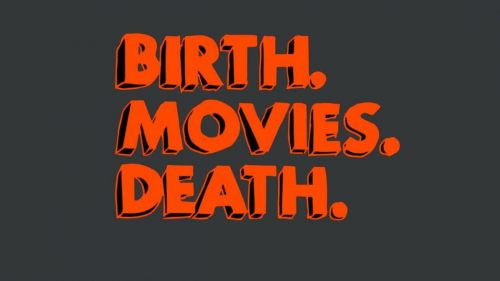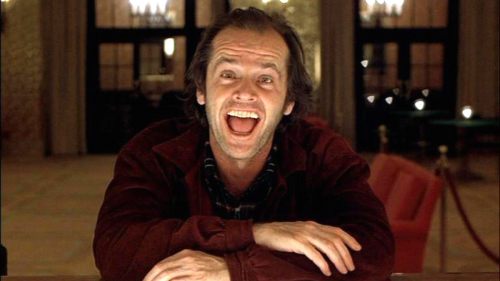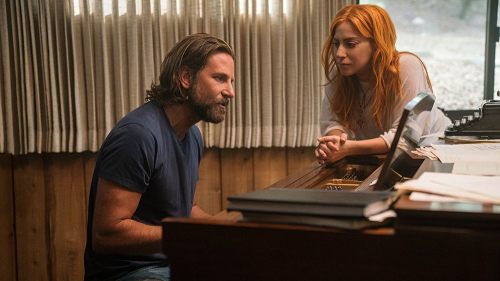BMD Picks: Our Favorite Rock & Roll Musicals
"We're far from the shallow now." While Bradley Cooper and Lady Gaga are busy tearing up the box office and earning themselves Oscar nominations for this week's A Star Is Born, we here at BMD thought it'd be great to get together and give you four of our favorite rock musicals. In typical fashion, none of these movies came even close to earning the same level of success Cooper's Star is sure to gain, but they totally spoke to us on a pure, primal level...just like our favorite riff-heavy tracks. Check it out...
*****

The Apple [1980] (d. & w. Menahem Golan)
No rock musical is more rock-musical than Menahem Golan’s Cannon Group classic The Apple. A music-industry retelling of both Faust and Adam and Eve, set in the far-flung rock’n’roll dystopia of 1994, The Apple presents the music industry as the ultimate evil in the world. Up-and-comers Alphie and Bibi are pressured into signing with BIM, the record label that runs the world, and soon get swept into a whirlwind of sex, drugs, and...well, the rock and roll part is obvious.
One can describe the story of The Apple, but that doesn’t do justice to the grotesquely catchy earworms on its soundtrack. Ridiculously overproduced, with songs featuring electronic wizardry and hundred-singer choirs, the songs are slick pop numbers that are impossible to expunge from one’s brain. One sequence sees From Russia With Love’s Vladek Sheybal singing a reggae number about how great it is to be Satanically-empowered billionaire asshole Mr. Boogalow. Another uses a naked drug metaphor to describe America’s obsession with fame; yet another, “Coming For You,” is among the most sexually-explicit songs ever to be featured in a G-rated motion picture.
Nearly every song in The Apple is accompanied by enormous dance routines featuring more sequins and glitter than the human eye can physically take in. The movie is Biblical in proportions as well as in story, eventually descending (or ascending?) into a weird hippie Rapture. A stage production of The Apple would instantly be the most expensive show ever made. Nobody would come to see it - except me. Hell, I’d direct it. - Andrew Todd
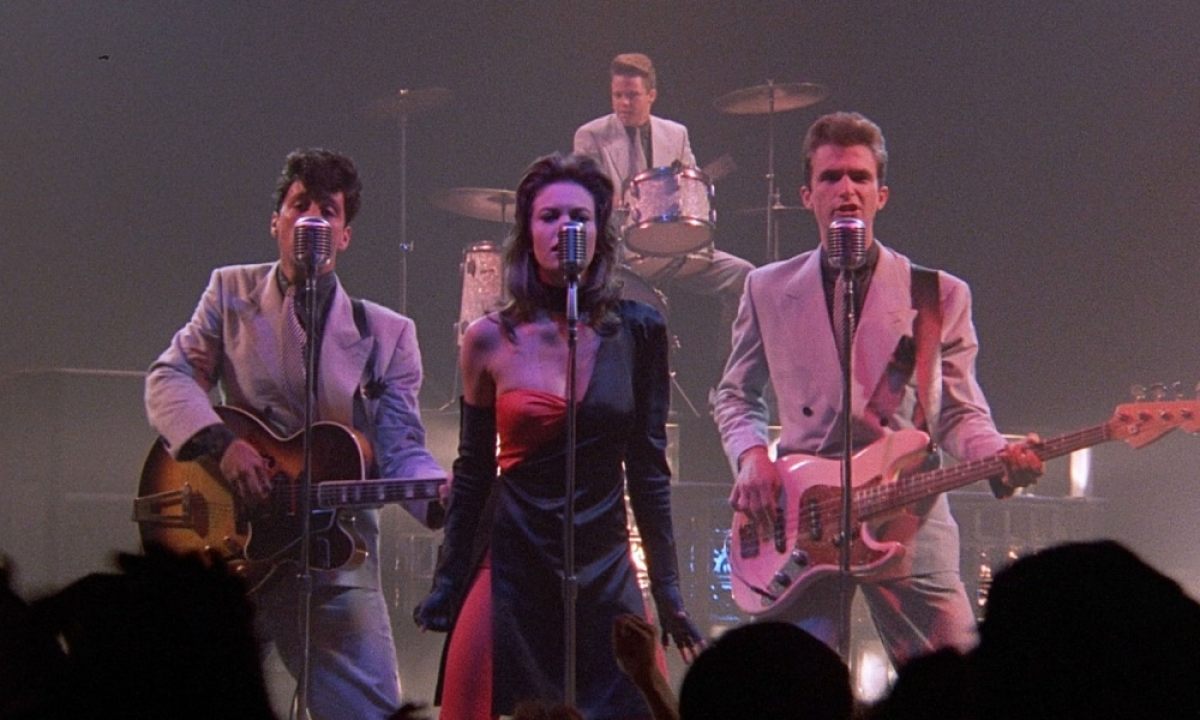
Streets of Fire [1984] (d. Walter Hill, w. Larry Gross & Walter Hill)
"Another time. Another place." This is the title card that opens Streets of Fire ('84), Walter Hill’s gorgeously surreal “Rock & Roll Fable”. Blending the look of ’60s greaser gang period pieces (think Philip Kaufman's The Wanderers ['79]) with the neon-drenched synths of ’80s glam, Hill amalgamates a universe that feels like a parallel dimension of our own. Streets of Fire is an adolescent fever dream after dropping acid and listening to too much Meat Loaf; our burly hero (Michael Paré) searching for his estranged, hair-tossing goddess of a lady love (Diane Lane), after she's been snatched away by a snarling reptile in patent leather overalls (Willem Dafoe). Realism takes a backseat to atmosphere, as Hill again confirms that facts in filmmaking are far less fascinating than fantasy.
Yet, for all the action picture opulence (that the director was an absolute master of) Streets of Fire’s most intoxicating moments come when Hill films the picture like a live musical, capturing Ellen Aim and her Attackers with the live-wire awareness of a concert videographer. Beyond wanting to immerse you in this world he’s created, Hill cements Aim as a rock icon, and Lane completely throws herself into the band's performances, making you forget that it’s all lip-synching, choreography, and a blend of two singers' voices (Laurie Sargent and Holly Sherwood). These are exhilarating set pieces, handled with the same thundering skill Hill applied to his gun battles, but without Lane’s blazingstage presence, they’d fall apart completely. Hail to the Queen of Rock & Roll. - Jacob Knight

Velvet Goldmine [1998] (d. & w. Todd Haynes)
Velvet Goldmine is a cinematic love letter to glam rock dipped in glitter and dressed in drag. A celebration of some of the most influential rock icons of the '70s, Todd Haynes' fictionalized account of the life and times of David Bowie salutes an era that inspired a generation of outcasts to embrace their true identity.
Journalist, and former glam fan, Arthur Stuart (Christian Bale) walks us through the rise and fall of pop idol Brian Slade (Jonathan Rhys Meyers). In a series of vibrant vignettes recalled by his nearest and fiercest friends, we see how Slade's space alien persona, Maxwell Demon, broke through the walls of conformity to become a symbol of freedom, individuality, and bi-sexuality for a generation of lost souls. Haynes journeys behind the mask of fame to expose how the glam rock scene gave its fans the license to dress the way they wanted, think the way they wanted, and, above all else, to love the way they wanted. Beneath all the glitter and glam, that's what rock and roll is all about.- Emily Sears
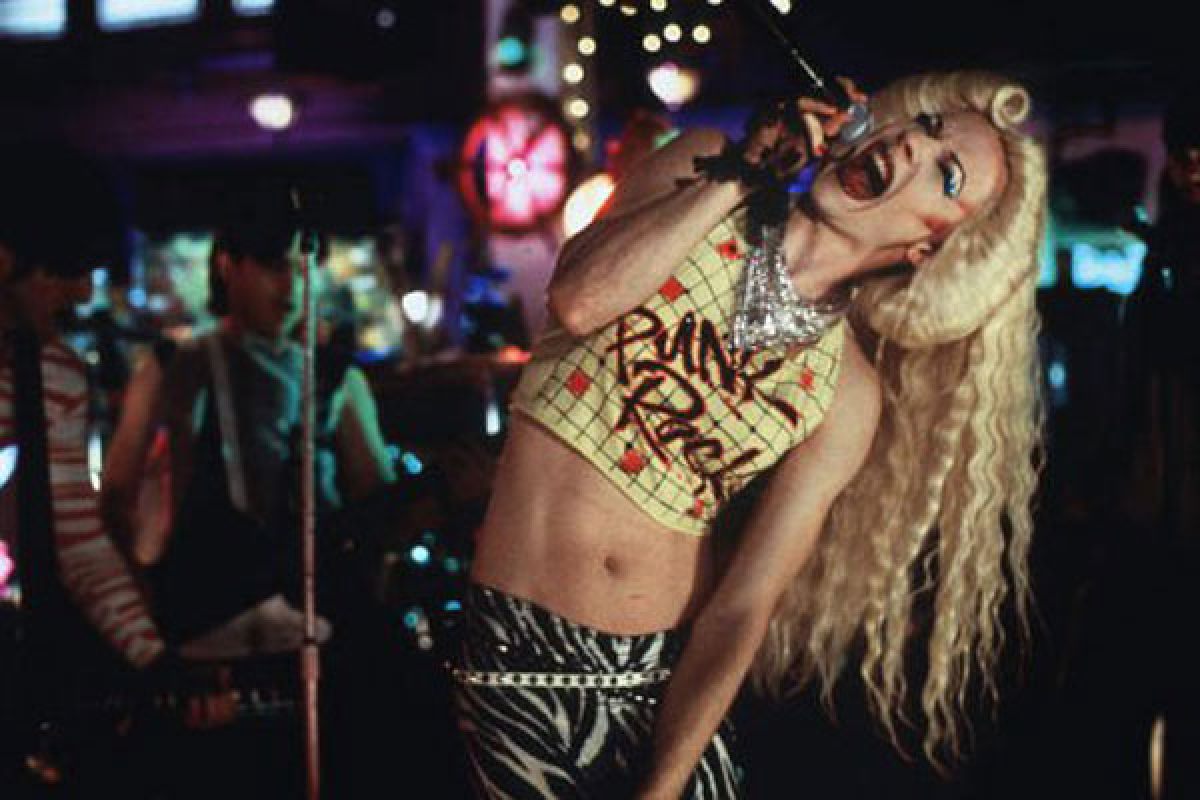
Hedwig and the Angry Inch (2001) [d. & w. John Cameron Mitchell, music by John Cameron Mitchell & Stephen Trask]
Hedwig has a complicated place in the pantheon of queer cinema. John Cameron Mitchell is a cisgender gay man who wrote a musical about gender fluidity, but in being a pioneer of mainstream depictions of transgender identity, his story is fraught with assumptions that feed into preconceived outsider notions of what it means to be transgender. However, that doesn’t change its place in the pantheon of influential queer films of its time. Its story of a transgender rock star immigrant is an exploration of duality that goes beyond gender into the complications of hero worship, the philosophical divide between Eastern Europe and the West, and the bitter realities of living in cultures that reject a person’s ability to explore themselves.
But the piece that will of course stick with most viewers is the music. Accompanied by avant garde animations that create a mythology of human disconnection and performances that push the boundaries of conventional sexual propriety in family restaurant settings, Hedwig and the Angry Inch is an infectiously catchy, in-your-face sensual assault. The enigmatic finale leaves one with more questions than answers, but the desire to continually revisit Hedwig’s rock anthems might just bring you a little closer to those answers. - Leigh Monson

